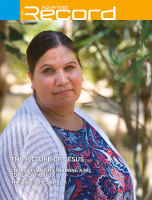I was standing in the garden of our Wahroonga home where my family was living temporarily. We had recently returned to Australia from Malaysia, my dad was working at the Sydney Adventist Hospital and I was plonked into my third school in as many years. It was in that milieu that my eight-year-old self had the most profound spiritual thought of my life: What if the man I become later in life walks away from the God I love today? What control do I, just a kid, have over the future adult me?
It turns out that they were the right questions to ask. And the right time to ask them.
George Barna concludes from his research that a person’s worldview is developed by the time they are just nine years old. “Habits related to the practice of one’s faith develop when one is young and change surprisingly little over time,” he found. He also found that the younger a person is when they adopt a faith, the more likely they are to remain committed to it.
Standing in the sunny garden, I decided that I would never, ever, ever give up my love for Jesus Christ. And here I am, 42 years later, writing this note to you from an office across from where that old house once stood—precisely and entirely because of the decision that my eight-year-old self made all those years ago. It hasn’t been a straight path. Nor unblemished by any stretch of the imagination. But the faith I have today is because of the decision I made then.
Now that I have my own children I think about what I can do to ensure they find a trusting relationship in Christ while they are young, so when they are old they don’t depart from it. I’ve asked children’s ministry experts. And I’ve had the very good fortune of visiting Greg Pratt’s family service at Reedy Creek church in Queensland.
Personal experience, research and the Reedy Creek service convinced my wife and I that we couldn’t afford church to be a boring irrelevance during our children’s early years. And so we worked together with a group of friends and a couple of outstanding pastors—Mark Baines and Alban Matohiti—to create a church service aimed at engaging and inspiring kids. So what does the church service look like and is it working? Timing matters. Kids at my daughters’ school eat lunch at 11 am Monday to Friday, so we decided not to put church in the middle of their lunch hour. Instead, we start at 8.45 am, just like at school. We begin with a couple of songs that the kids lead. Then one of the children gives a welcome and says the opening prayer.
About 10 minutes into the service the sermon begins and lasts 15–20 minutes—like a TED talk. Not to dumb it down—but to smarten it up. Do sermonettes make Christianettes? Maybe. And that’s why we aim for serious, thoughtful, spiritually challenging sermons that are well constructed and well delivered. Because how much you communicate is related to how well your sermon is prepared, not how long you take to deliver it.
Remember, the Sermon on the Mount only takes 11 minutes to read. Churchill’s “Blood, Toil, Tears and Sweat” speech? Only five minutes. Abraham Lincoln’s Gettysburg Address? Less than three minutes. We agree with William Shakespeare that “brevity is the soul of wit”. And, so far, it seems our kids do too . . .
Why have the sermon so early in the program? Because sermons require the most intense amount of attention. So we front-load the sermon when our concentration is fresh. Make sense?
And after the sermon? An interactive activity. Why? Because people learn not just from hearing but by interacting and exploring.
Time to build relationships in and out of church is integral to the service. Not an accidental add on to the “real church business”—loving each other IS the church business! As Jesus said, “Your love for one another will prove to the world that you are my disciples” (John 13: 35).
So how is our adventure in church service utopia going? Judging by the enthusiasm of the children who attend, it’s going extremely well. And that matters. Because inside their hearts and their minds is who they will be, not just now but for the rest of their lives. They may be “just kids” but these kids are determining right now who their adult selves will be.






